What are implants?
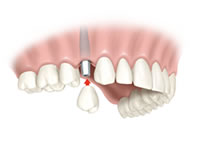
When patients loose a tooth, our dentists at our Tokyo clinic attach an artificial root to the gums, and then attach an artificial tooth to it. In most cases, patients recover full functionality and cannot tell the difference between the implant and their natural teeth.
The Merits of Implants
- The new tooth is steadily anchored into place, giving patients the same feeling as if they were biting with their natural teeth.
- Flavors and sensations are not distorted.
- The surrounding teeth are less likely to wear off prematurely. The implant shares biting duties with the other teeth, relieving them from the extra pressure they were subjected to.
- Implants are designed for the long term.
- Implants look natural; patients don't need to worry about their appearance.
- The jaw bone receives its natural stimulation through biting and the risk of the bone becoming weaker disappears.
The steps to implants
Planning
Before attempting surgery, our dentists must confirm if an implant is viable. We must make sure that the body is in good health and can recover from the intervention. High blood pressure, diabetes and other diseases could be risk factors, but should not present problems if they are being treated. If advanced periodontal disease or cavities are present, they must be treated before moving forward.
With the help of X-rays and CT scans, our dentists draw a plan on how to insert the roots into a spot that provides sufficient strength. This is an extremely delicate task, and should carried out only by experienced dentists.
Finally, dentist and patient decide on a time for the operation. The patient also receives advice on how to prepare, as well as post-surgery recommendations.

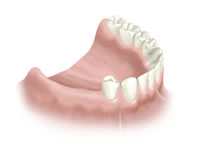
Surgery
Normally the surgery lasts for about an hour, depending on the density and shape of the bone. Once the roots are in place, attaching the teeth can take in the best of cases one day, but it may also take up to several months.
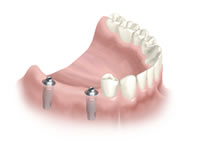
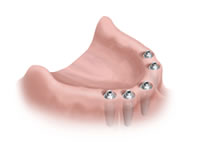
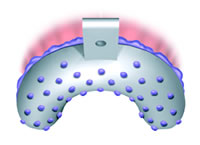
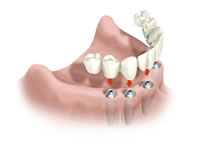
Maintenance
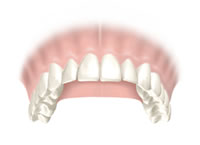
Implants need to be taken care of just like natural teeth. They need to be brushed daily to prevent plaque or tartar buildup. Periodic check-ups with our dentists are also necessary. If taken care for properly, implants have been known to last upwards of 40 years.
| Treatments | Price(Taxes Included) | Comments |
|---|---|---|
| Surgery costs | 30,000 yen | The cost is the same regardless of how many teeth are being treated. |
| Root implants | Price varies depending on the number of roots and their position. | |
| Regular implants (1 root) * 1 |
250,000 yen times number of roots | |
| Regular implants (three roots or more) |
200,000 yen times number of roots | Discounted rate for upwards of three roots. |
| Wide / Narrow (1 root) * 2 |
300,000 yen times number of roots | |
| Wide / Narrow (three roots or more) * 3 |
250,000 yen times number of roots | Discounted rate for upwards of three roots. |
| Connectors (Abutments) |
15,000 yen times number of roots | The connector is attached to the head of the new tooth and links it to the root. The charge applies from the second time onwards. |
| Temporary crowns (for implants) |
8,000 yen times number of teeth | The charge applies from the third time onwards. This step is sometimes omitted at other clinics but it is extremely important. |
| Metal bonding crown | 150,000 yen times number of teeth | Made from 100 percent ceramics. It is tougher than an ultra-hard resin product and does not discolor easily. |
About the treatments
 * 1
* 1Regular implants: Implants of normal size.
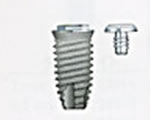 * 2
* 2Wide implants: The diameter is bigger, and they are used for molars.
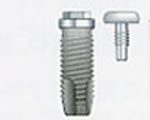 * 3
* 3Narrow implants: The diameter is smaller and they are used for the front teeth.
 :
: